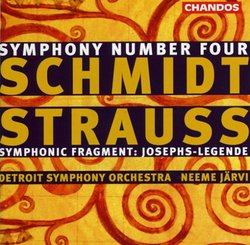Schmidt's Elegiac Fourth
Thomas F. Bertonneau | Oswego, NY United States | 11/23/2000
(5 out of 5 stars)
"Let's describe a certain hypothetical composition - stipulating hypothetically that it's by an Austrian composer - and then try whether we can identify it in the real world. An extended work for orchestra, it deploys in its first few bars a long monodic line characterised by intervals not of the third but of the fourth; for its remainder, it reworks this basic material polyphonically, pitting the line against itself, inverting it, retrograding it, weaving a dense and continuously evolving texture out of it using all possible permutations and combinations. Is it a twelve-note composition by Schoenberg, Berg, or perhaps Krenek? Is it one of those darkling scores bereft of identifiable melody that fall upon the ear like so much righteously cacophonous mathematics? No. It is the Fourth Symphony in C-Major (1935) by Franz Schmidt (1874-1939). Schmidt, a cellist in the Vienna Philharmonic under Gustav Mahler (he retired after Mahler's death in 1911), cultivated what Stephen Johnson, in his essay in Robert Layton's "A Guide to the Symphony," calls a principle of "inner connection." In Schmidt's music, one part is always related organically to every other part, and the whole forms a perfect unity of expression. No score could illustrate this better than the Fourth Symphony, remarkable right away for being a tragic work in the open key of C-Major. Schmidt penned this music in the aftermath of his daughter's death in childbirth. It constitutes a wordless requiem for the departed. Every aspect of the Fourth derives from the slow, mournful trumpet melody heard unaccompanied at the outset: There is a richly polyphonic Allegro Moderato, an Adagio with a prominent solo line for cello, a fugal scherzo in the form of a Tarantella, and a chilling return to the opening trumpet-solo pitched now a fifth higher than when first heard. The trumpet-tune lodges immediately in the memory; the other material stemming from it likewise presents a memorable profile. One also easily kens the profound kinship of all this material. Rich harmonies prevail throughout as does a sumptuous orchestral palette. Neeme Järvi leads a deeply convincing performance with the Detroit Symphony, equal to the old London performance by Zubin Mehta and the Los Angeles Philharmonic Orchestra. The disc adds the "Symphonic Fragment" that Richard Strauss drew from his ballet "Josephs-Legende.""
Beautiful performance of a Moving Work
mahlerii@aol.com | Richfield, MN | 04/26/1999
(5 out of 5 stars)
"Schmidt's Fourth Symphony should be counted as a modern masterpiece. Like the Gorecki 3rd, it is not necessarily foreshadowed in his other works. There is a quality of Bruckner and Elgar here, with lots of nobililty. This work was written in the aftermath of the death of his little daughter, and it is filled with sorrow. But there is hope also. Most beautiful is the 2nd movement which has a gut-wrenching climax at its center. No one else could have written this moving work. The Strauss is just the opposite: showy and glittery, with not much substance. Jarvi once again plays this music with authority and the Chandos sound is full and well-bodied. Listen to the Schmidt 4th-you'll be glad you did!"
Solid Modern Symphony
E. Clinton | Chicago, IL USA | 05/23/2000
(4 out of 5 stars)
"This symphony is quite good as is the performance by the Detroit Symphony. The work is serious. Schmidt's daughter had recently passed away and the mood of the symphony is that of grief. This gives the symphony a depth sometimes lacking in modern symphonies."


 Track Listings (5) - Disc #1
Track Listings (5) - Disc #1